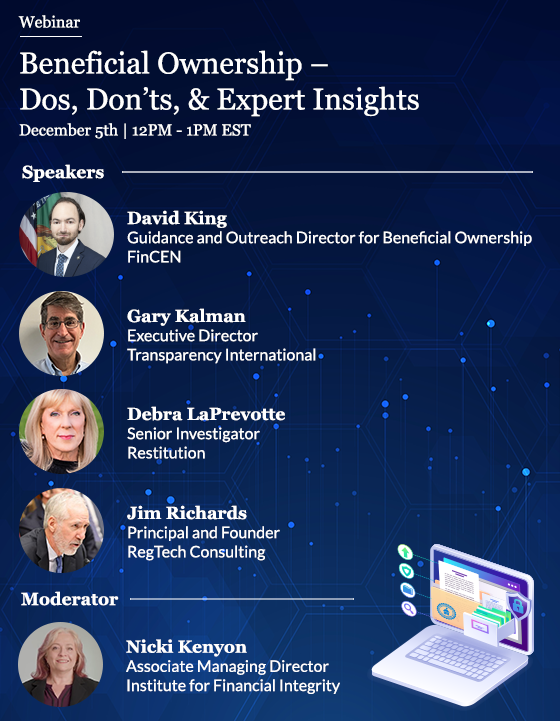Webinar Recap
The Dos, Don’ts & Expert Insights on Beneficial Ownership
📅 December 10, 2024
📅 December 10, 2024
Note: This article is a summary of IFI’s recent webinar, “Beneficial Ownership – Dos, Don’ts, & Expert Insights.” Click here to access the full recording.
Congress in 2021 passed the Corporate Transparency Act (CTA) that created a new beneficial ownership information reporting requirement in an effort to make hiding illicit assets through the use of shell companies and other opaque ownership structures more difficult. Shell companies in the United States have been used to move billions of dollars in illicit proceeds, and according to the Foundation for the Defense of Democracies, financial secrecy has allowed terrorists, drug kingpins, and dictators to launder billions of dollars through the U.S. financial system. These illicit funds are then used to kill Americans, weaken U.S. national security, and foment war and chaos around the globe.
Any corporation, limited liability company (LLC), or other entity created by filing a document with a secretary of state or similar office in the United States, unless they qualify for a specific exemption must register. Most businesses formed through official state filings need to file a beneficial ownership information (BOI) report with FinCEN. Specific exemptions are listed on FinCEN’s website. They include publicly traded companies meeting specified requirements, many nonprofits, and certain large operating companies, which in many cases are already providing beneficial ownership and other in-depth information to regulators about their structures.
Gary Kalman voiced concerns about the exemptions and potential loopholes in the current version, and Jim Richards highlighted that the database needs to grow and mature to be effectively used by law enforcement and financial institutions, comparing the current requirements to planting grapes in a vineyard and allowing them to grow and mature.
Our expert panelists highlighted the importance of transparency in maintaining the integrity of the U.S. financial system. They emphasized the role transparency plays in combating threats like drug trafficking, terrorist financing, and money laundering.
Deb LaPrevotte noted that when Russia invaded Crimea in 2014, the U.S. government saw more than $40 billion siphoned out of Ukraine under former president Yanukovych. According to LaPrevotte, U.S. shell corporations were used as modes of facilitation to help move money out of Ukraine, and she provided concrete examples of investigations in which she was involved as an FBI agent. Gary Kalman added that notorious Russian arms dealer Viktor Bout, who was recently released in a prisoner exchange with Russia, used shell companies, including in Texas, Florida, and Delaware, to move arms and money around the world. Kalman also highlighted a 2011 seminal study by the Stolen Asset Recovery (StAR) Initiative that found in roughly 70 percent of grand corruption cases an anonymous company was involved in hiding assets.
Beneficial ownership information can be a critical national security and public safety tool, according to our experts, and all the resources put into law enforcement will do no good if investigators run into a brick wall and cannot follow the money.
A Circuit Court judge in Texas recently granted a motion for a “nationwide injunction” sought by the National Federation for Independent Businesses (NFIB) as part of its lawsuit challenging the constitutionality of the CTA. The judge ruled that the CTA is “likely unconstitutional because it’s outside of Congress’s power,” meaning that companies required to report their beneficial ownership information under the CTA “need not comply” with the law by the January 1, 2025, reporting deadline.
Although our experts could not provide legal advice about whether or not webinar participants should register their beneficial ownership information by the deadline, Gary Kalman anticipates that the case will eventually wind up in the U.S. Supreme Court and remains optimistic about the CTA’s survival. In addition, all the panelists highlighted how simple and quick the registration process is on FinCEN’s website.
Some have argued that the CTA has nothing to do with national security or foreign policy, so Congress doesn’t have the constitutional authority to issue regulations to businesses. However, our panelists pointed out that Congress has the authority to regulate interstate commerce, and the plaintiffs do not have a single client that doesn’t engage in interstate commerce by virtue of operating nationally accessible websites. In addition, the Constitution gives Congress the authority to provide funding, authorize programs, and conduct oversight when it comes to the implementation of foreign policy. And since sanctions evasion, arms trafficking, and fentanyl trafficking are all national security and foreign policy concerns, our panelists are confident that the CTA will be upheld.
If you’re wondering whether you have to file, just remember: attending a webinar is not legal advice, and you should check with your attorney about whether you should file.
Our panelists reminded our audience that the beneficial ownership information is a first step in the effort to protect the U.S. financial system.
The participants presented valuable suggestions for beneficial ownership data handling. Gary Kalman highlighted the importance of data verification along with the need for public registries to allow open access to interested parties – a practice currently in place in the EU. Jim Richards, on the other hand, indicated potential challenges of publicly making all beneficial ownership information, due to cultural and privacy sensitivities within the United States.
Deb and Jim both highlighted the need for details about how much of a company a beneficial owner owns. The percentage could be anywhere from 25 percent to 100 percent, and who “controls” a company is a subjective criterion that may not be helpful when determining whether to accept a risky client. Our experts also recognized that FinCEN—the U.S. financial intelligence unit—has fewer resources than many of its counterparts in much smaller economies, which presents a challenge when verifying the information in the database.
Our panelists’ expertise, coupled with their collective commitment to and passion for transparency and financial integrity, resulted in a informative and engaging discussion, with numerous questions and engagement from the audience. To learn more about the Corporate Transparency Act, explore its benefits, challenges, and future, visit the FinCEN frequently asked questions page and join the Institute for Financial Integrity for further engagement and developments.
Note: although FinCEN had to cancel their participation in the webinar, the agency provided a statement about the recent court decision regarding the CTA:
“The Corporate Transparency Act (CTA) plays a vital role in protecting the U.S. financial system, as well as people across the country, from illicit finance threats like terrorist financing, drug trafficking, and money laundering. We continue to believe—consistent with the conclusions of other federal courts—that the CTA is constitutional. Yesterday’s ruling is one of several cases pending before courts around the country, including ones in which district courts have denied requests to enjoin the CTA and that are now before courts of appeals. We are reviewing the ruling to determine our next steps. We would refer you to DOJ for any further information about the case.”
Join the Institute for Financial Integrity for a comprehensive webinar that provide firms and financial institutions with knowledge and strategies they need to ensure they comply with new beneficial ownership rules and regulations.
Led by regulatory, anticorruption, and industry experts, this webinar equips learners with insights into the nuances of the new beneficial ownership reporting requirements, addresses concerns about privacy, security, and access, and explores strategies to research beneficial ownership and reduce your exposure to financial crime risk.











 Safeguarding Trust – How to Balance Innovation and Security in Gen AI-Powered...
Safeguarding Trust – How to Balance Innovation and Security in Gen AI-Powered...This site uses cookies. By continuing to browse the site, you are agreeing to our use of cookies.
Accept settingsHide notification onlySettingsWe may request cookies to be set on your device. We use cookies to let us know when you visit our websites, how you interact with us, to enrich your user experience, and to customize your relationship with our website.
Click on the different category headings to find out more. You can also change some of your preferences. Note that blocking some types of cookies may impact your experience on our websites and the services we are able to offer.
These cookies are strictly necessary to provide you with services available through our website and to use some of its features.
Because these cookies are strictly necessary to deliver the website, refusing them will have impact how our site functions. You always can block or delete cookies by changing your browser settings and force blocking all cookies on this website. But this will always prompt you to accept/refuse cookies when revisiting our site.
We fully respect if you want to refuse cookies but to avoid asking you again and again kindly allow us to store a cookie for that. You are free to opt out any time or opt in for other cookies to get a better experience. If you refuse cookies we will remove all set cookies in our domain.
We provide you with a list of stored cookies on your computer in our domain so you can check what we stored. Due to security reasons we are not able to show or modify cookies from other domains. You can check these in your browser security settings.
These cookies collect information that is used either in aggregate form to help us understand how our website is being used or how effective our marketing campaigns are, or to help us customize our website and application for you in order to enhance your experience.
If you do not want that we track your visit to our site you can disable tracking in your browser here:
We also use different external services like Google Webfonts, Google Maps, and external Video providers. Since these providers may collect personal data like your IP address we allow you to block them here. Please be aware that this might heavily reduce the functionality and appearance of our site. Changes will take effect once you reload the page.
Google Webfont Settings:
Google Map Settings:
Google reCaptcha Settings:
Vimeo and Youtube video embeds:
You can read about our cookies and privacy settings in detail on our Privacy Policy Page.
Privacy Policy